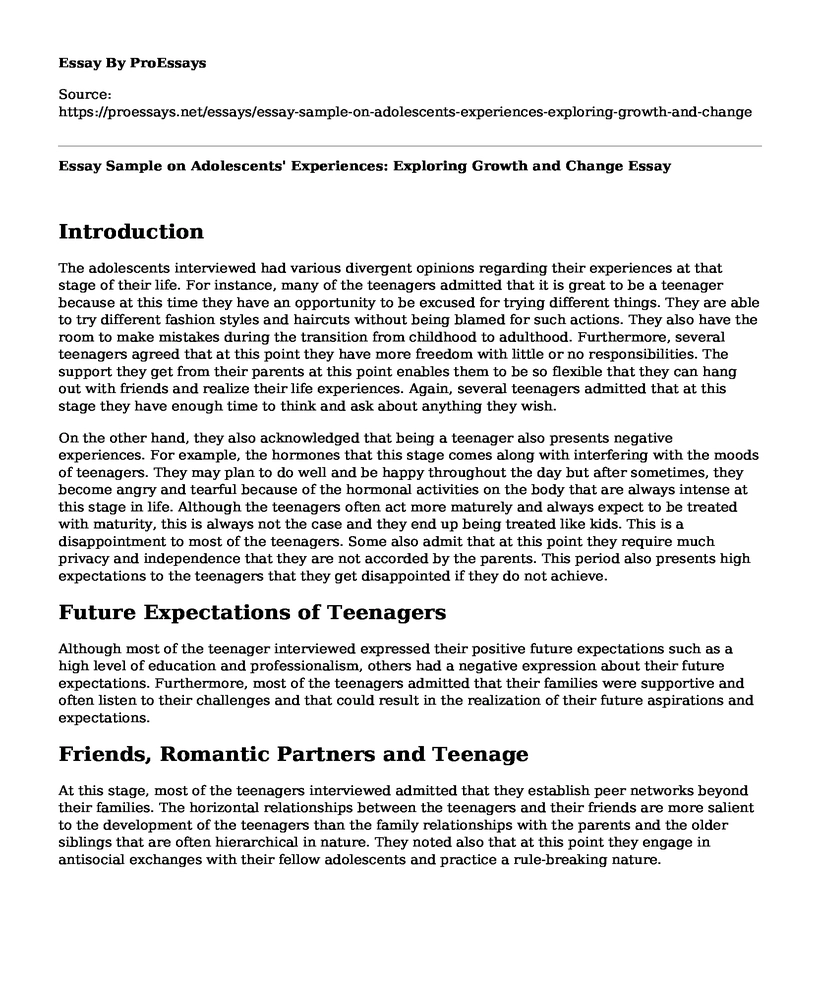Introduction
The adolescents interviewed had various divergent opinions regarding their experiences at that stage of their life. For instance, many of the teenagers admitted that it is great to be a teenager because at this time they have an opportunity to be excused for trying different things. They are able to try different fashion styles and haircuts without being blamed for such actions. They also have the room to make mistakes during the transition from childhood to adulthood. Furthermore, several teenagers agreed that at this point they have more freedom with little or no responsibilities. The support they get from their parents at this point enables them to be so flexible that they can hang out with friends and realize their life experiences. Again, several teenagers admitted that at this stage they have enough time to think and ask about anything they wish.
On the other hand, they also acknowledged that being a teenager also presents negative experiences. For example, the hormones that this stage comes along with interfering with the moods of teenagers. They may plan to do well and be happy throughout the day but after sometimes, they become angry and tearful because of the hormonal activities on the body that are always intense at this stage in life. Although the teenagers often act more maturely and always expect to be treated with maturity, this is always not the case and they end up being treated like kids. This is a disappointment to most of the teenagers. Some also admit that at this point they require much privacy and independence that they are not accorded by the parents. This period also presents high expectations to the teenagers that they get disappointed if they do not achieve.
Future Expectations of Teenagers
Although most of the teenager interviewed expressed their positive future expectations such as a high level of education and professionalism, others had a negative expression about their future expectations. Furthermore, most of the teenagers admitted that their families were supportive and often listen to their challenges and that could result in the realization of their future aspirations and expectations.
Friends, Romantic Partners and Teenage
At this stage, most of the teenagers interviewed admitted that they establish peer networks beyond their families. The horizontal relationships between the teenagers and their friends are more salient to the development of the teenagers than the family relationships with the parents and the older siblings that are often hierarchical in nature. They noted also that at this point they engage in antisocial exchanges with their fellow adolescents and practice a rule-breaking nature.
Risky Behaviors of Teenagers
The interviewed teenagers also admitted that they are often involved in risky behaviors such as unprotected sexual activities with their romantic partners, sexting, tobacco smoking, alcohol use, and binge drinking. Furthermore, some of the teenagers agreed that they are often involved in risky behaviors such as dangerous driving, illegal activities such as trespassing and vandalism, fighting as well as truancy. These could be due to the hormonal changes at this stage. The risky behaviors of the teenagers are often framed with the consideration of the causal factors and their effects
Teenagers’ Family Lives
Some of the teenagers acknowledged the support they get from their parents and the siblings at this stage in life. They admitted that the parents play great roles in the care and emotional support of the teenagers. Family support and care prevent or reduce the risky behaviors of teenagers such as alcoholism and problems such as depression among others. The family also supports and builds the identity, optimism, and self-confidence of the child. The improved academic achievements are also realized in the families when the parents are supportive of their teenagers. They admitted that these family ties are often realized through regular family meals and the celebrations of the accomplishments of the child. A timely family meeting is also used to solve the problems that teenagers may be undergoing.
However, there the parents should understand certain things that teenagers often feel although the parents do not often take them seriously. For example, the teenagers are young adults who are learning to be independent, safe and make decisions regarding relationships. Therefore, they often wish to participate in constructive arguments within the household. Some parents do not offer the audience for the teenagers and thus limit their opinions and flexibility. Parents should understand the viewpoints of the teenagers and should show support to the innovate ideas of the children. The teenagers also need respect from their parents. They argue that respect is two-way traffic. For instance, parents should be gentle on the teenagers in case they contravene household rules. This will also encourage respect from teenagers towards their parents. Some parents also have the assumptions that their teenagers are full of mayhem and dishonesty that is often not the case with all the teenagers. The parents should always be positive and expect the best from their children rather than the usual negative attitudes they often have towards the children.
Cite this page
Essay Sample on Adolescents' Experiences: Exploring Growth and Change. (2023, Jan 14). Retrieved from https://proessays.net/essays/essay-sample-on-adolescents-experiences-exploring-growth-and-change
If you are the original author of this essay and no longer wish to have it published on the ProEssays website, please click below to request its removal:
- Unconditional Love Song
- Essay Sample on Understanding Human Experience Across the Health-Illness Continuum
- Essay Example on Online Dating: Seeking Long-Term Relationships?
- Essay on Self-Medication Model and Substance Abuse/Dependence/Psychiatric Disorders
- Essay Sample on Eating Disorders: Evolutionary Changes in Feeding Habits
- Free Report on English Language: Key to International Job Market Success
- Essay Sample on the Best Day of My Life







